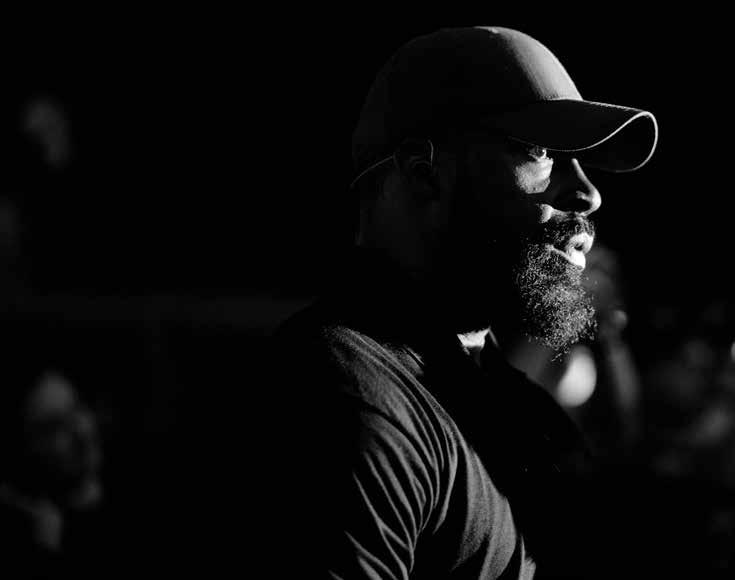
3 minute read
[New] BEHAVIOR AND REPUTATION
Self-discipline is very important as well as the ability to get on and communicate with others. The last thing you need on a job are people who are always arguing, complaining, backstabbing etc. All this does is bring down the overall morale of the job and in the end the friction in the team will affect the service being supplied to the client.
You will find people all the time that will creep up to the client and their close staff trying to win brownie points. There is a big difference between doing your job and creeping up to the client. Influential and rich people are used to people coming to them for favors or money and usually have little respect for them and will lose respect for you if you do so. The main thing that people forget is that they are just another member of staff to the client. The client can sack their whole security team if they feel like it for one person’s mistake, it happens. Your attitude should be to go to work, do your job, and go home again, stay out of the politics and petty arguments.
Advertisement
I said earlier jealousy is a huge problem in the close protection world, so trust no one, people will sabotage you to take your job or get you replaced by one of their friends etc. It’s a job, the people you work with are not your friends!
Punctuality is another subject not covered on a lot of close protection courses but is very important. You should always be at least 15 minutes early whether it is to relieve another team member or to go out with your client. If you are working a static job, it is very annoying to be relieved late, especially if your relief does not have a good reason for doing so. This can cause friction within a team and lead to dismissals. If you are going to be late, for whatever reason, inform the person you are relieving or your client ASAP. Being late or missing a shift can cause major problems for the client, team leaders and managers.
Your appearance is an extremely important and your clothes should always be clean and neat. If you are dressed immaculately you will appear to exude confidence and strength and people will assume that you have the knowledge and the ability to take care of yourself. You should always dress to the client’s requirements; for corporate clients this usually means in a suit, but some clients prefer their security to wear casual clothes.
Suits should be of a dark color; a conservative fine pin stripe is preferable to a fashion suit. You should always get a big double-breasted jacket that can be done up and conceal what equipment you are carrying on your person, i.e. radios, phones, note books/diaries, first aid kit, weapons, extra ammo, etc. If you are carrying weapons, you will usually keep your jacket undone. A double-breasted jacket will conceal what is under you jacket better than a single breasted one. And remember an oversized unbuttoned jacket is a good indication that someone is armed.
Your shirts should always be clean. Try not to always wear white shirts, most people who wear suits all the time wear colored shirts, dress to blend in with your environment. In hot weather, colored shirts have the advantage of not showing sweat or dirt so much as white shirts. Where possible, always keep a spare clean shirt to hand and change when possible. Your tie should be silk, it should be a darker color than your shirt, and the knot should be of medium size, but this size should match the collar.
Do some research on how to dress properly if you’re not use to wearing suits or formal cloths. You don’t have to spend big money to dress properly if you know how to match and wear the cloths properly. You can spend a few thousand dollars on a suit and still look like a sack of shit if you don’t know how to dress properly. Personal presentation is a very important part of your skill set!
You might need to wear a belt and braces (suspenders); belts are a necessity for carrying radios or weapons. Braces will keep your trousers up with all the equipment you've got on your belt. Black shoes will go with any color suit except brown, laced shoes are preferable to slip-ons, no buckles, and no combat boots. Personally, I prefer laced dress boots, wingtips or Chelsea boots. Always ensure the shoes or dress boots you are wearing have a good griping sole. There seems to be a fashion habit these days of people wearing brown shoes with dark suits, well I think we are bodyguards not fashionistas, so best to keep things conservative! Socks should be dark in color and should match the suit. The only expectable jewelry is wedding bands. If you have tattoos, they should be covered.
Dress codes should always be checked with the client and match their requirements, the environment, and the locations you’re visiting. If the client is OK with tracksuits, shorts and t-shirts and with tattoos showing that’s fine and up to them, they are paying the bills. On long term jobs you want to be comfortable, and the team leaders and managers should work out an appropriate dress code with the client.
If you smoke, never smoke when you are on duty or

![[New] CLASSIFIEDS](https://assets.isu.pub/document-structure/230104162153-912c8f5e8d3aa85cf4d4f5ea11523339/v1/a5653236e2030a66d0d61cf5802c5bc1.jpeg)


